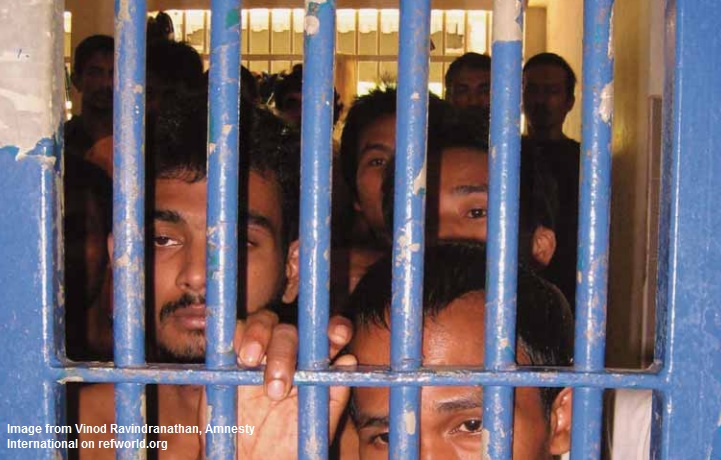By Ralvin Manikam
In the past decade, Malaysia has seen the increase of foreign nationals in the country; our neighbours from Bangladesh, Indonesia and Myanmar make up the construction force that build our roads and train tracks – something that Malaysians have come to believe is a job not for locals. These ‘pendatangs’ toil all day under the sun only to return to a cramped space in a shop lot that they share with many others who are resigned to their fate of being a “Bangla” or “Indon” in Malaysia.
Their contributions are much needed by us Malaysians so that we may one day call ourselves a developed nation, but we choose not recognise this when they die in their line of work. This is in stark contrast with the issue of maid abuse which saw perpetrators be put behind bars for deliberate acts of violence – and the public outcry that followed.
However, the same public rage is not apparent in the case of “Banglas” and “Indons” who die as a result of negligence by their superiors from big name construction firms. Much like Malaysians themselves, the government too, shows no urgency to prosecute those at fault.
Is it because torture of domestic workers is ‘worse’ than negligence leading to death? in the end, a life is lost, question is: who will be held responsible?
The recent string of deaths of Bangladeshi workers in Malaysia questions the negligence of employers who have not increased measures to provide safer conditions under which foreign workers can work.
Just last week a Bangladeshi worker was dug out of the three meters of sand that he was buried in, in an accident at a construction site in Temoh, Perak. Another body was excavated at the same site after two hours of search and rescue operations – under nine meters of soil. Their names were M Abu Talib, 30, and Iqbal Hossain, 32, both from Dhaka.
This Tapah incident came on the heels of yet another death of a Bangladeshi national in the Mass Rapid Transit project (MRT) last week. The victim, Rijaul Abdul Goni, 40, had died on the spot after steel bars had fallen on him after ties holding the bars together gave way.
The MRT project had previously taken the lives of three Bangladeshis in a fatal accident in Kota Damansara which saw the resignation of the then-MRT Chief Executive Officer Mohd Azhar Abdul Hamid. Mass Rapid Transit Corporation Sdn Bhd (MRT Corp) later found that insufficient supervision on site had failed to provide a comprehensive inspection and test plan, and poor sub-contractor management had led to the death.
The matter is now left to Department of Occupational Safety and Health (DOSH), and if it indeed does find similar findings as MRT Corp, after which, it will be up to Putrajaya to take action against the subcontractors, and other parties for negligence.
It would be interesting to see if Putrajaya takes a strong stand for the safety of foreign workers in the case of the MRT mishaps or if it would sweep this issue under the carpet along with other tragedies involving foreign workers.
Malaysia is undoubtedly one of the worst places in the world for migrant workers to earn a living. Last year, Global Rights Index rated the country at 5 (the worst rating apart from war torn countries), which, despite having legislations that spell out worker’s rights, are not accessible to workers who are therefore exposed to autocratic regimes and unfair labour practices. This places Malaysia “on par” with countries such as Nigeria, and Saudi Arabia, and worse than neighbouring Indonesia and Singapore.
This unfairness that we demand of foreign labor, aside from how cheaply they are shortchanged with measly wages, is to put their lives at risk for a job that Malaysians refuse to undertake. The job risk, coupled with the low wage, is what turns Malaysians themselves away.
Some believe that these risks are a result of the lack of importance placed by employers on foreign worker safety.
Consider the case of a female foreign worker Radni, 29, who on 17 February was flung out of a lorry while heading to work at an oil palm plantation in Gedong, Serian, Kuching.
It was reported that she boarded the back of the lorry along with other foreign workers on the way to the plantation. The incident happened when the vehicle had hit a bump, flinging her out of the back of the lorry, after which her head hit a rock. She was pronounced dead on arrival at a nearby medical clinic.
Like in the case of Radni, Malaysians are accustomed to seeing many foreign workers cramped at the back of a truck, and in questionable conditions – but turn our gaze to something less depressing. How often do Malaysians themselves call relevant authorities to report such an incident? What is the difference then, between the public who turn a blind eye, the employers who placed her at the back of the truck, and the government who deliberate on taking action against the main contractors responsible for negligence?
This ignorance of the right of foreigners to be treated with dignity is doubly worrying in a country that “boasts” the highest foreign labor dependency in South East Asia, making up 32% of the country’s total workforce of 4.37 million. This does not include illegal foreign workers.
The attitude of Malaysians, and Putrajaya was best exemplified by the Human Resources Minister Richard Riot Jaem who had once publicly stated that foreign workers weren’t only “happy” in Malaysia, but that this country was a “heaven on earth” for them.
As long as Malaysians speak this way, and embody the same delusions as the minister, we are punishing those helping to build this country and its infrastructure. No amount of ignorance and passing the buck will diminish this perception of Malaysia as hell on earth for foreign workers.
-The Rocket




